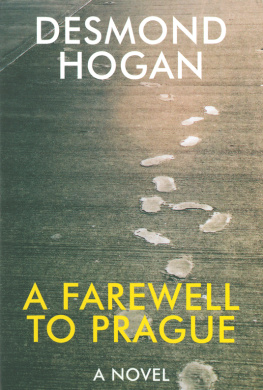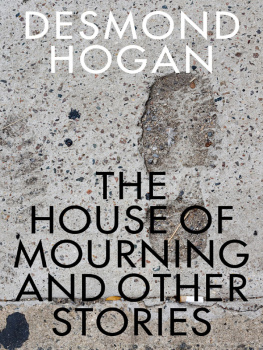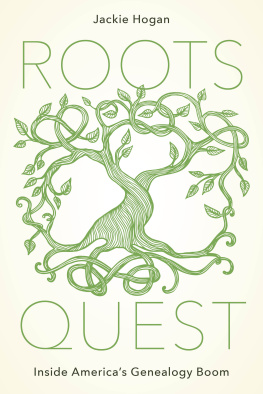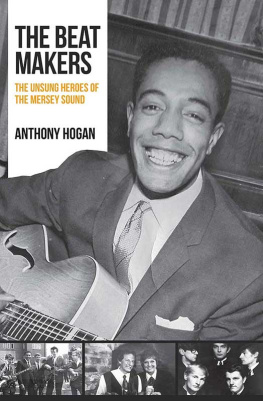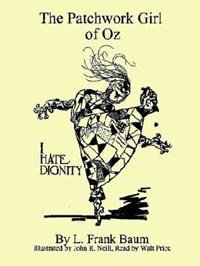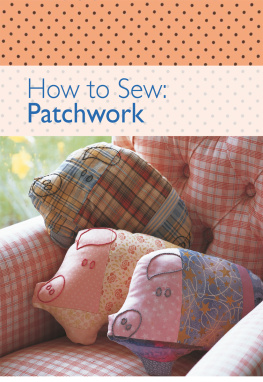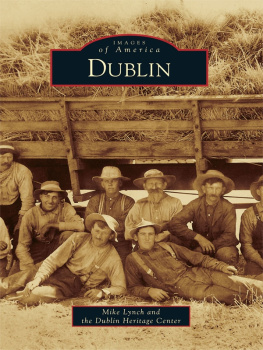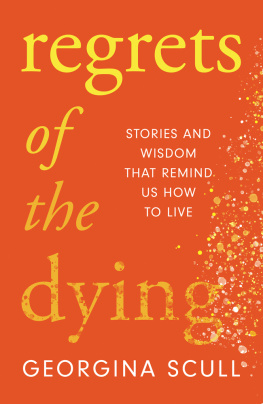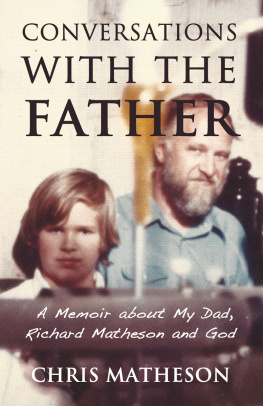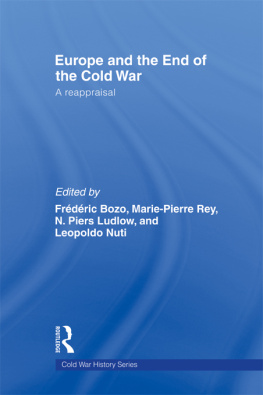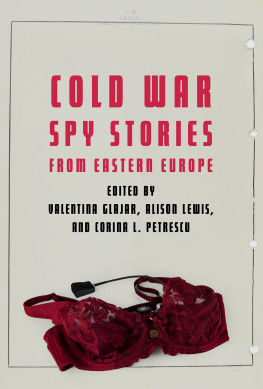SELECTED OTHER WORKS BY DESMOND HOGAN
The Ikon Maker
The Leaves on Grey
A Curious Street
A New Shirt
The Edge of the City: A Scrapbook 197691
The House of Mourning, and Other Stories
A Farewell to Prague

Originally published by Faber and Faber, London, 1995.
Copyright 1995 by Desmond Hogan
First Dalkey Archive edition, 2013
All rights reserved
Library of Congress Cataloging-in-Publication Data
Hogan, Desmond, 1951
A farewell to Prague / Desmond Hogan. First Dalkey Archive edition
pages ; cm
ISBN 978-1-564-78979-2 (e-book)
1. IrishEuropeFiction. 2. IrishUnited StatesFiction. 3. Southern StatesFiction. I. Title.
PR6058.O346F37 2013
823.914dc23
2013003002
Partially funded by a grant from the Illinois Arts Council, a state agency

www.dalkeyarchive.com
Cover: design and composition by Mikhail Iliatov
Printed on permanent/durable acid-free paper
In memory of Jonathan Warner, with gratitude.
CONTENTS
wie heisst es, dein Land
hinterm Berg, hinterm Jahr?
Ich weiss, wie es heisst.
Wie das Wintermrchen, so heisst es,
es heisst wie das Sommermrchen,
das Dreijahreland deiner Mutter, das war es,
das ists,
es wandert berallhin, wie die Sprache,
wirf sie weg, wirf sie weg,
dann hast du sie wieder, wie ihn,
den Kieselstein aus
der Mhrischen Senke,
den dein Gedanke nach Prag trug
Paul Celan, Es ist alles anders
what is it called, your country
behind the mountain, behind the year?
I know what its called.
Like the winters tale, it is called,
its called like the summers tale,
your mothers threeyearland, thats what it was,
what it is,
it wanders off everywhere, like language,
throw it away, throw it away,
then youll have it again, like that other thing,
the pebble from
the Moravian hollow
which your thought carried to Prague
Translated by Michael Hamburger
What are you going to do now?
Dont know. Go to Africa.
Robin had his arms about me and behind him I could see the mecca of dirty-black and nebulous South-East London high-rises.
We were on the eleventh floor of a high-rise.
As he held me, I was touching in my mind the great naked statue of David in Florence Id travelled to once from University College, Dublin, having climbed steps to it, finding it wet from November rain.
I was in the same gesture with Robin as Id been with a girl two weeks before, in a high-rise in Catford, whod had the sudden inspiration to try to change my sexuality. A teacher from the polytechnic I had worked in part-time, she had stood, naked from the waist up, for this embrace. I was wearing a white sleeveless vest which had a theatrical ancientness. The woman who held me was from Antrim.
Shed told me that night about a young boy with a tattoo showing a gentian-violet swallow bearing a bunch of pink roses on his right arm. She used to sleep with him on the beaches of North Antrim the previous summer. Hed run around at night in the full regalia of the IRA, come home in the small hours when his mother would be waiting to give him a box on the ears. One night he went out in his regalia to inspect a place where he knew Semtex to be buried and was shot dead by the British Army.
Robin had a semi-troglodyte face that always looked as if it was going to apologize for something, sable curls barely held back from it. His cheeks had a high violet colouring and he had large lips, the lower lip always pulsating a little, which had been sealed by many people, men and women.
His mother had called him Robin because he was born in the year Robin Lee Graham had sailed from South Africa to California and to remind them all there was a photograph over the piano in Pulvensey showing Robin Lee Graham with sun-kissed hair holding up a dorado fish.
The cassette player was playing a Marvin Gaye song:
Has anyone seen my old friend Martin?
Can you tell me where hes gone?
He freed a lot of people but it seems the good die young.
I just looked around and hes gone.
From the corner of my eye, reflected in a mirror, I could see a buff-coloured dole card beside a few tubes of oil paint. The flat belonged to a friend of Robins. We had spent the night here, sleeping on mattresses a few feet away from one another because Robin was covered in spots hed gotten from sleeping with a girl on the heath in Pulvensey. She had tried to kill herself when he wouldnt intensify the relationship, slashing her wrists, was put in the mental hospital in Norwich, dyed her hair cowslip-pale and alizarin and haze-blue and escaped in a diseased bituminous fur coat, taking the boat to France.
Robin was teaching English at the moment in Hastings. Hed come to London for Friday night.
Well, Im off to Prague in a few weeks, Robin said.
Ive been to Prague.
I know.
Suddenly I started crying. I broke down crying a lot now. My mind seemed to stop and the world blurred. There were a few weeks when even walking was difficult, walking was walking through torpor and if not it was an intoxicating experience. A pendulum inside propelled me back and forth. There was no way forward, no further lap I could make, and the only thing that seemed possible was to exit, to finalize myself to save others trouble and to preserve intact achievement, totality.
Words had stopped for me, the ability to speak, the ability to express. And instead of words came images from childhood.
A drummer in the brass band whod emigrated to Glasgow, a collector of cigarette cards showing athletes, always wore nice suits, sometimes floral waistcoats, became engaged to a member of the Legion of Mary in Glasgow, and then one day, inexplicably, in a suit, hankie in his breast pocket, jumped off a bridge into the Clyde.
A boy with a Teddy-boy quiff whod chalked a billiard cue in the mens club and played billiards the night his mother died.
Later he went to South Africa for a few years, then became a singer in England, turned alcoholic, lived as a tramp. Recently I had seen a scrawled sign for his singing outside an Irish pub in London. Its the crack here every Saturday night.
His name had been Guy Micko Delaney. Micko for a father who had left his mother, gone to fight in the war, lived with a Russian woman in Crouch End and died they said of drugs in the late nineteen-forties.
Cocaine Bill and Morphine Sue
Were walking down the avenue.
He was in Berlin in 1945 and had brought home a girls Holy Communion wreath, lilies appliqud on lace, that he had found in a wrecked house. Mrs Delaney had buried it with him when he died.
Micko was the bad element of our town. I was Micko now, or had become so these past months.
Robin and I said goodbye at Kennington tube station. An Alsatian, not too big, leapt into a youths arms in the waste ground nearby.
Ill write.
Flashy-coloured or old technicoloured postcards in my mind: a boy in mod clothes stealing the scene from a pair of nuns on Salthill prom; a guard directing traffic under Nelsons Pillar.
I walked home. A baby was crawling around the window of a pawnbrokers in Camberwell. Lampposts were swathed with posters for wrestling, a Mardi Gras incoherence about the way they were pasted over one another, a bricolage of names like Kendo Nagazaki and Ravishing Robbie Hagan, of mammal-like breasts and Titan heads in balaclavas.
Next page
